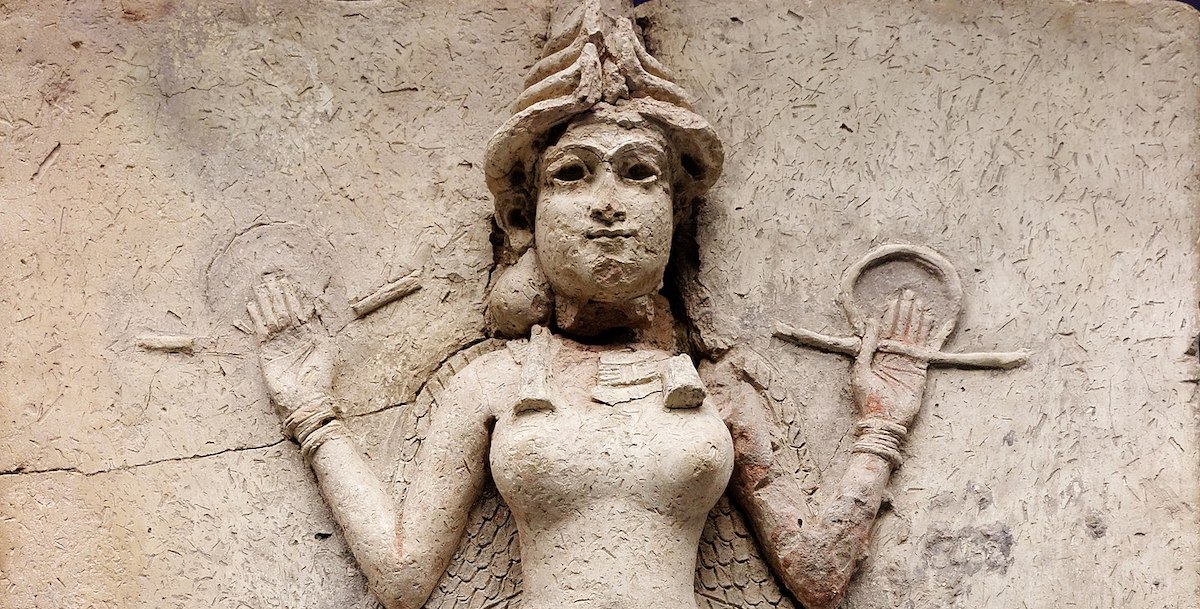Who Was Enheduanna? The World’s First Author, Explained

Happy Women’s History Month! This month—like Black History Month, Pride Month, and other heritage months—gives us a chance to look at not just how women have risen to prominence throughout history, but the ways that women have shaped history itself. Case in point: Enheduanna, the world’s first known author.
Who was Enheduanna? Read on to learn all about this ancient Mesopotamian priestess and poet.
Who was Enheduanna?
In the 23rd century BCE, a priestess moved from the kingdom of Akkad to the Sumerian city of Ur. There she took on the name Enheduanna, meaning “Ornament of Heaven.” In Ur, she served as a high priestess to the Sumerian moon god Nanna, composing hymns and poems while she tended to her duties at the temple.
How did this women get such a sweet gig? She was the daughter of Sargon of Akkad, also known as Sargon the Great. Sargon swept into Sumeria from the north, conquering its city-states and becoming ruler of the Akkadian Empire, the first known empire on Earth. According to the BBC, Enheduanna helped her father manage his new empire by combining the belief systems of Sumeria and Akkad. For example, Enheduanna took the Akkadian goddess of love and war, Ishtar, and merged her with her Sumerian counterpart, Inanna. To this day, the two goddesses are widely regarded as two faces of the same deity.
However, as you can imagine, the Sumerians resisted the colonization of their cities and the appropriation of their culture. At some point in Enheduanna’s career, a Sumerian rebel named Lugal-Ane forced her into exile, although she eventually regained her position.
As high priestess, Enheduanna composed at least 42 hymns, among other works. Although there are written works predating Enheduanna’s hymns, she’s the first known author in history to have her name attached to her writing.
Enheduanna’s major works
When you read Enheduanna’s hymns, you can hear echoes of later works, like Biblical psalms. Take, for example, this excerpt of a hymn to Inanna, translated by Jane Hirschfield.
Lady of all powers,
In whom light appears,
Radiant one
Beloved of Heaven and Earth,
Tiara-crowned
Priestess of the Highest God,
My Lady, you are the guardian
Of all greatness.
Your hand holds the seven powers:
You lift the powers of being,
You have hung them over your finger,
You have gathered the many powers,
You have clasped them now
Like necklaces onto your breast.
Enheduanna’s most famous hymn is her “Exaltation of Inanna,” written during her period of exile. Here’s an excerpt from the Electronic Text Corpus of Sumerian Literature:
Lady of all the divine powers, resplendent light, righteous woman clothed in radiance, beloved of An and Urac! Mistress of heaven, with the great pectoral jewels, who loves the good headdress befitting the office of en priestess, who has seized all seven of its divine powers! My lady, you are the guardian of the great divine powers! You have taken up the divine powers, you have hung the divine powers from your hand. You have gathered up the divine powers, you have clasped the divine powers to your breast. Like a dragon you have deposited venom on the foreign lands. When like Ickur you roar at the earth, no vegetation can stand up to you. As a flood descending upon (?) those foreign lands, powerful one of heaven and earth, you are their Inana.
However, “Exaltation” isn’t just a song of praise. In the poem, Enheduanna rages against Lugal-Ane, and begs Inanna and other deities to restore her to her position in Ur.
Suen, tell An about Lugal-ane and my fate! May An undo it for me! As soon as you tell An about it, An will release me. The woman will take the destiny away from Lugal-ane; foreign lands and flood lie at her feet. The woman too is exalted, and can make cities tremble. Step forward, so that she will cool her heart for me.
It’s not surprising that history’s first known author is a complicated figure. After all, literacy itself has historically been dependent on wealth and privilege. Was Enheduanna a holy woman or a colonizer? Either way, her legacy has left us with stunning poetry, and a glimpse into the politics and spirituality of an ancient civilization.
(featured image: Gennadii Saus i Segura via Wikimedia Commons)
Have a tip we should know? tips@themarysue.com